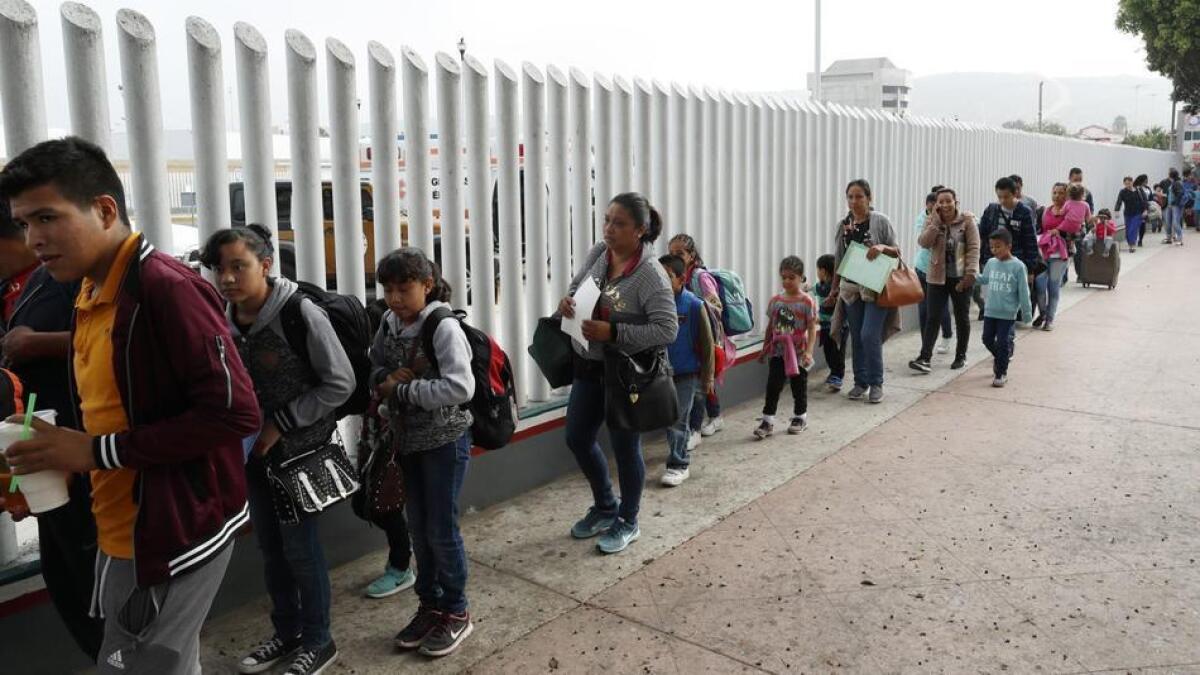More members of Central American caravan enter U.S. through port of entry in San Ysidro

- Share via
Reporting from Tijuana — After more than a month of waiting in Tijuana, more members of the Central American migrant caravan are being admitted into the U.S. through the San Ysidro port of entry to claim asylum.
Although some members of protected groups – such as LGBTQ men and women – have already entered the United States, the majority of asylum seekers from the caravan had to wait because of a backlog. Most are fleeing violence or poverty in their home countries.
Carlos, 24, a migrant from Honduras who does not want his last name published for fear that it will negatively affect his asylum claim, put his name on the wait list on Nov. 29.
Every day, between 40 and 100 names are called from the Mexican side of the San Ysidro port of entry. Carlos’ name was called Thursday but he wasn’t around to hear it.
Like most members of the caravan, Carlos lives in a temporary migrant shelter on the outskirts of Tijuana that is a 30-minute drive from San Ysidro. He didn’t have a ride Thursday morning.
“I was so worried and I couldn’t do anything about it,” he said.
Fortunately, he found a volunteer from Sanctuario Caravana, an organization that has been providing free transportation to migrants between El Barretal and San Ysidro.
Carlos arrived at the port of entry at 6:30 Friday morning and waited until organizers announced the next batch of names at 9:15 a.m. Despite being absent the day before, organizers honored his spot on the list.
Mexican immigration authorities escorted him and a group of two dozen migrants into the United States, where he will be interviewed to see whether officials here believe he has a credible fear of persecution in his home country — the first step in the asylum process.
Transportation between El Barretal and San Ysidro has been an issue for asylum-seekers since the Mexican government moved caravan members into the shelter. Hundreds refused to leave the original shelter, which was a short walk away from the port of entry, saying they’d rather sleep on the streets than move far away.
Government officials do offer free rides to Mexican immigration offices, which is a two-hour walk away San Ysidro. Volunteers from Sanctuario Caravana only have five drivers.
That leaves migrants like Renan Rodriguez, 42, of Honduras with few transportation options.
On Friday morning, Rodriguez panhandled outside El Barretal until he raised 34 pesos – or $1.75 – for a one-way bus ride to San Ysidro. There are more than 3,000 people on the wait list ahead of him, but Rodriguez goes to the port of entry once a week to make sure that he doesn’t miss his name being called out.
Rodriguez estimates that he will have to wait another month before crossing into the United States through the port of entry.
Advocacy groups have criticized the asylum wait list. They claim it violates U.S. and international law, calling for asylum seekers to be immediately processed because they are fleeing danger.
Several caravan members have died in Tijuana, including two teenagers who were stabbed to death. Another woman was run over by a drunk driver who she claims targeted her specifically. Last week, two men threw a canister of tear gas into El Barretal. No one was injured, but migrants said the message was clear.
Carlos, the migrant who was set to enter the United States on Friday, traveled from Honduras with his brother. Local gang members threatened to kill both of them back home, they said.
Once they arrived in Tijuana, his brother refused to wait. He crossed into the country illegally and was detained by Customs and Border Protection. Carlos has not heard from him since.
Carlos did not want to take that risk.
“I want to do things the right way,” he said. “I didn’t want to cross like that and risk getting sent back to Honduras.”
Solis writes for the San Diego Union-Tribune
More to Read
Sign up for Essential California
The most important California stories and recommendations in your inbox every morning.
You may occasionally receive promotional content from the Los Angeles Times.










